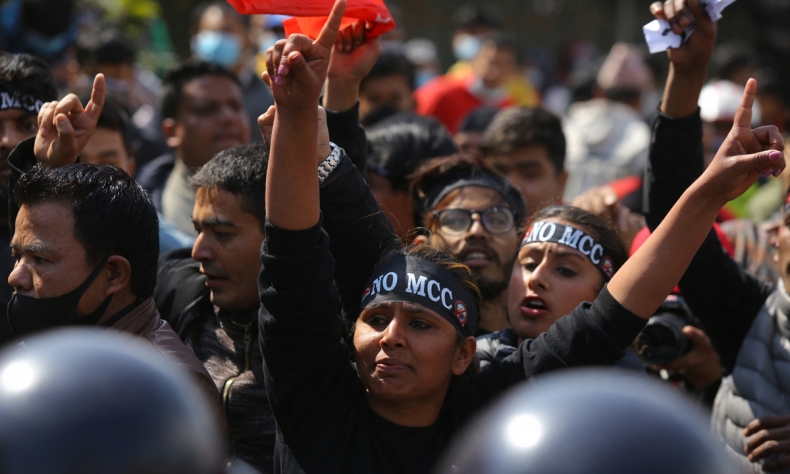Nepal Ratifies MCC But Will It Be Beneficial to the Country?

Nepali people should be careful to the so-called grant of MCC, and show their firm stand to protect the national interest and maintain friendly relations with other countries.
Nepal’s Parliament on February 27 ratified the Millennium Challenge Corporation (MCC) Nepal Compact under which Nepal will receive a $500 million grant from the United States. However, the compact has triggered strong protests in the country and the disputes over the compact are expected to continue.
Before its ratification, Nepal has been struggling to find a common consensus on whether to receive or reject the MCC grant, and the US government a few weeks ago gave Nepal the ultimatum of February 28 to endorse the MCC pact in parliament. Washington further warned that if Nepal rejects the MCC, it will review its relationship with the country.
MCC is a US foreign bilateral aid agency established by the US Congress in 2004. It claims that it aims to provide investment in infrastructure projects in developing countries to help them get out of poverty. However, it has encountered resistance in many countries because many of its provisions will elevate US personnel and US laws above the laws of the recipient country. Critics say such terms violate Nepal’s sovereignty.
On February 10, US Assistant Secretary Donald Lu, held separate telephone conversations with Nepali leaders: Prime Minister Sher Bahadur Deuba, KP Sharma Oli, and Pushpa Kamal Dahal “Prachanda”, pressuring them to approve the MCC pact by February 28. The US side warned that If Nepali leaders fail to do so in time, the US will review its ties with Nepal. Nepali politics now is immensely divided on the MCC agreement. Many Nepali international law experts, academics, and common people raised concerns about some of the pact’s provisions, which, they say, directly infringes on Nepal’s constitution and sovereignty.
Washington is sending a clear message to the world that its aid comes along with certain conditions and pressure. That is why a majority of Nepali people are against the MCC, believing that it could hamper the country’s sovereignty and independence, particularly, its foreign policy.
Section 7.1 of the MCC compact says, “the parties understand that this Compact, upon entry into force, will prevail over the domestic laws of Nepal.” This provision directly threatens Nepali sovereignty, laws, and institutions.
There is no doubt that MCC is a part of the US Indo-Pacific strategy (IPS) which serves for the US containment of China. American senior officials have not denied this point. At this point, Nepal does not need to accept a grant like MCC and any program as it will interfere in her friendly relations with other countries. US officials stated they will not revise or change any terms of the MCC pact.
On the one hand, the US government had said it is up to Nepal to receive or reject the pact, but at the same time, it applies considerable pressure on Nepal to approve the agreement.
Prime Minister Sher Bahadur Deuba had been doing everything to get the necessary support to pass and implement the MCC agreement. He was at least clear on this mission no matter whether it is a good or bad decision. Other senior leaders of coalition partners like Pushpa Kamal Dahal “Prachanda”, Madhav Kumar Nepal, and others showed double standard at first, but at last they agreed to pass. They told their party cadres that leadership would not support the deal and would prepare to oppose it. But the leadership did not oppose it. In government, ministers spoke in favor of the MCC, while most small parties had voiced opposition to it.

Protest to the US deal after its ratification is intensifying; people are angry and have made their views known by holding huge protests. Civilians, civil groups, and some party cadres had taken to the street, urging national leaders to cancel the pact. They demanded the government not to receive any foreign aid which infringes on domestic affairs and disrupts the nation’s foreign policy. People, who were marching against the MCC pact, took the example of Sri Lanka which rejected the MCC grant in November 2020.
For decades, Nepali governments have practiced a non-alignment principle in foreign policy. On occasion, however, some leaders have tried to destroy this basic principle. The MCC pact is one in which Nepal’s current leaders have shown remarkable short-sightedness in their approach. Many Nepali people are against the deal, and yet, senior leaders are ignoring the voice of the people. Once people see the reality of what the deal means in practice, they will become furious and launch a massive campaign against the MCC.
The MCC pact is not good for the national interest of Nepal. It will hinder the country’s sovereignty, independence, and domestic law. Further, the pact runs against the non-alignment principle of Nepal’s foreign policy. Nepal should not allow any foreign power to use its soil to commit acts against those of other nations. Nepali people should be careful to the so-called grant of MCC, and show their firm stand to protect the national interest and maintain friendly relations with other countries.
Dr. Buddhi Prasad Sharma is an associate professor at Leshan Normal University and senior research fellow at the Centre for Trans-Himalaya Studies.
The article reflects the author’s opinions, and not necessarily the views of China Focus.
 Facebook
Facebook
 Twitter
Twitter
 Linkedin
Linkedin
 Google +
Google +










